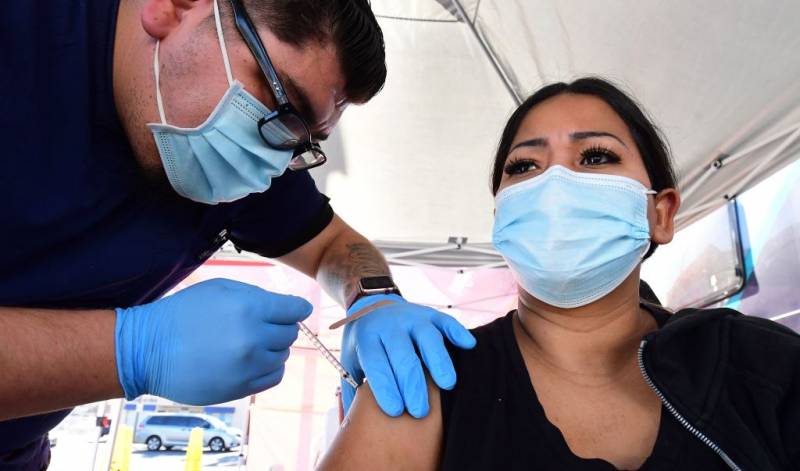Additionally, the governor said California would provide up to two free rapid COVID-19 tests for each of the state's more than 6.1 million public K-12 students to take before returning to school in January. Hours will also be extended at the state's nearly 6,300 state-run testing centers.
Newsom said booster shots provide more protection against omicron, and was encouraged that more than 8.8 million Californians had gotten one so far.
“We need to increase that number if we're going to hold the line and decrease the growth for hospitals,” he said
California, Newsom said, is doing a lot better than most states in terms of the virus' spread, with a 3.3% positivity rate — the lowest in the country — and 13.6 new cases for every 100,000 people over the last seven days, the sixth-lowest rate in the country. It also has one of the lowest death rates per capita.
But, he cautioned, with cases again on the rise again, albeit at a rate much slower than last winter, “we can’t take anything for granted.”
California also requires other groups to either be vaccinated or submit to weekly testing, including state workers and, eventually, teachers and students. But Newsom said Wednesday there is no plan to require those other groups to get a booster shot — although he urged everyone eligible who hasn’t gotten one yet to schedule an appointment on the state’s My Turn site.
Newsom, however, said rules about booster shots could change.
“Hopefully we won't have to consider that if all of our interventions are successful,” he said.
California already requires health care workers to be vaccinated against the coronavirus, a directive that took effect in September, and one that most workers have complied with. Thousands of holdouts, though, have either lost their jobs or been suspended, sparking concerns that the newest rule could further exacerbate staffing shortages.
The California Hospital Association, however, was quick to back the order.
“While we don't yet know enough about omicron to determine its precise impact on the need for hospital care, we do know that booster shots offer an additional layer of protection — something that will be vital to ensuring care for all in need as California and the nation as a whole continue to face a persistent shortage of health care workers,” California Hospital Association President and CEO Carmela Coyle said in a statement.
Newsom, who in March 2020 imposed the nation’s first statewide shutdown order, initially announced this latest mandate — among the first of its kind in the country — on his personal Twitter account on Tuesday evening.
It comes as coronavirus-related hospitalizations have been rising slowly in California. As of Tuesday, there were 3,589 coronavirus patients hospitalized across the state, a 12% increase since Dec. 1. But that's far less than the peak of last winter's surge, when the state had nearly 22,000 coronavirus patients before vaccines were widely available. Now, more than 70% of the state's nearly 40 million residents have been fully vaccinated.
But while hospitals overall have fewer patients than last winter, many have fewer workers to treat the patients they do have. The staffing shortage comes as businesses, including hospitals, are having trouble finding workers. A recent UCSF study estimated the state’s nursing shortage could persist until 2026.
“The staffing shortages we are experiencing are worse than ever,” Kiyomi Burchill, group vice president for policy for the California Hospital Association, said in an interview Tuesday before Newsom made his announcement about booster shots.
California is poised for a surge in new infections amid holiday parties and family gatherings forced indoors by a series of winter storms.
But experts say the nation's most populous state is likely to avoid the worst scenario — spikes in hospitalizations and deaths — because most Californians have either been vaccinated or already been infected. That gives a higher level of protection against the omicron variant that, while not guaranteeing people won't get sick, means they are less likely to need to go to the hospital.
“It's a highly transmissible respiratory virus and people are going to get it. And they are going to get it every winter,” said Dr. Monica Gandhi, a professor of infectious diseases at UCSF. “We have to go toward measuring our true success with a disease, which is how we're doing with hospitalizations.”
Much about omicron remains unknown. Scientists say it spreads more easily than other coronavirus strains, including delta, and, in initial studies, appears to generally cause less severe illness. Early research suggests those who are fully vaccinated will need a booster shot for the best chance at preventing infection, but even without the extra dose, vaccination should still offer strong protection against severe illness and death.
Computer models used by state officials to forecast the virus say hospitalizations will stay steady through the holidays and dip slightly in mid-January.
“I'm on the fence a little bit about how horrible this is,” said Dr. Brad Pollock, associate dean for public health sciences at UC Davis School of Medicine. “We’re going to have more people infected because of the more transmissible variant. It may be a little less virulent, which means it causes less symptoms.”

